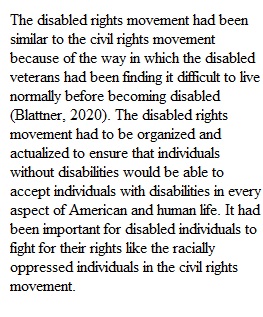


Q Welcome to Week 3! This week’s discussion centers on an exploration of disability from a social and political perspective, i.e., we will explore the social movement led by courageous people with disabilities, supported by others to secure the rights to equal access in all realms be they educational, employment, physical access to buildings and public transportation. The result is the passage of the Americans for Disabilities Act (ADA). The movement’s resemblance to the civil rights movement is readily apparent as we will read in the article, titled “Rosa Park’s Gifts to the Disabled” from “The other Movement that Rosa Parks Inspired”, by Charles Wilson, the Washington Post, Oct. 30, 20005, p. B-1 A. Compare the disabled rights movement to the civil rights movement. Discuss the connection between the civil rights movement to secure the rights of African-Americans to the rights movement that fought for the rights of persons with disabilities. B. Find an article relating to the struggle of persons with disabilities to achieve equal rights in any one of the areas mentioned above. (Please no articles on the ADA as we will focus on legal aspects later in the course). Summarize the article (your own words) and provide the link. Generate a question pertaining to its findings for your colleagues. C. Roosevelt and his “Bill of Rights”: The basic principle in a democracy is the sharing of governmental resources to meet the basic needs of all citizens. It must be understood that we are all in it together to satisfy that goal, i.e., it is a collective effort. Why is it necessary of our citizens to fight for equality? Why must we fight to obtain support for persons in need? Why must be fight for universal health care? This question points to a discussion of the responsibility of a democratic country to provide a vital "safety net" for all persons in need, whether they are poor, ill, have permanent disabilities, or are elderly. How persons in need are treated is a measure of a country's priorities. And these priorities change historically, depending on "who is in charge". During the Roosevelt administration, for example, the president proposed a second "Bill of Rights" to be ratified and made part of our Constitution, and it contained two items: 1) That all persons have a right to health care, and that health care should not be subject to profit (as is now the case); and 2) that everyone has the right to a decent standard of living, i.e., that everyone should have enough resources (even if supplied by the government) in order to live a decent life. Sadly, Roosevelt died before his proposal was reviewed. Question: Would it have been accepted and included in the Constitution, do you think? Were our president to make that proposal now, (in truth, he would never consider it) what would be the outcome? The answer to that question is at the crux of our climate of general unconcern for persons in need, and a government focused on enriching the wealthy. (Looking at the policies of countries like Sweden or Denmark gives us a glimpse of what a social democracy can do for its citizens.)
View Related Questions